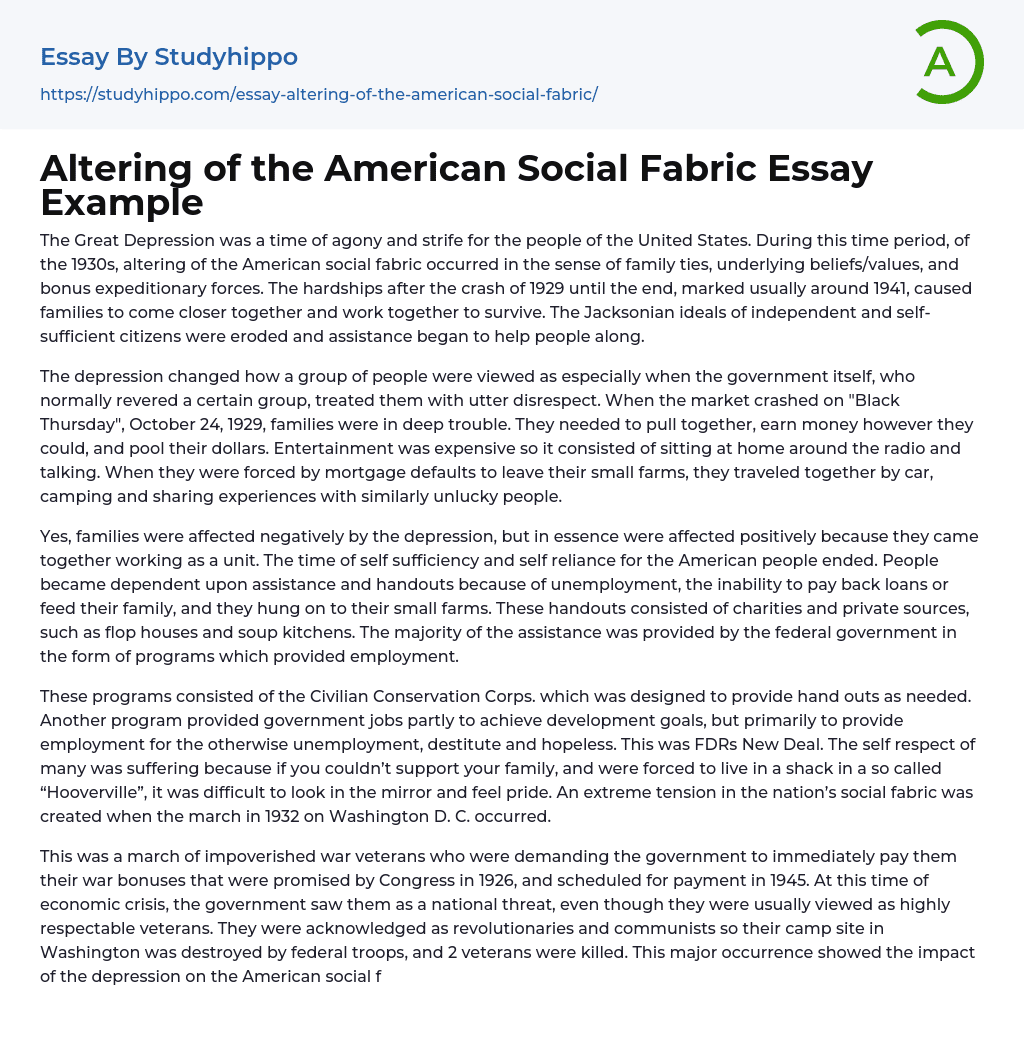The Great Depression was a time of agony and strife for the people of the United States. During this time period, of the 1930s, altering of the American social fabric occurred in the sense of family ties, underlying beliefs/values, and bonus expeditionary forces. The hardships after the crash of 1929 until the end, marked usually around 1941, caused families to come closer together and work together to survive. The Jacksonian ideals of independent and self-sufficient citizens were eroded and assistance began to help people along.
The depression changed how a group of people were viewed as especially when the government itself, who normally revered a certain group, treated them with utter disrespect. When the market crashed on "Black Thursday", October 24, 1929, families were in deep trouble. They needed to pull together, earn money however they could, and poo
...l their dollars. Entertainment was expensive so it consisted of sitting at home around the radio and talking. When they were forced by mortgage defaults to leave their small farms, they traveled together by car, camping and sharing experiences with similarly unlucky people.
Yes, families were affected negatively by the depression, but in essence were affected positively because they came together working as a unit. The time of self sufficiency and self reliance for the American people ended. People became dependent upon assistance and handouts because of unemployment, the inability to pay back loans or feed their family, and they hung on to their small farms. These handouts consisted of charities and private sources, such as flop houses and soup kitchens. The majority of the assistance was provided by the federal government in the form of programs which provided
employment.
These programs consisted of the Civilian Conservation Corps. which was designed to provide hand outs as needed. Another program provided government jobs partly to achieve development goals, but primarily to provide employment for the otherwise unemployment, destitute and hopeless. This was FDRs New Deal. The self respect of many was suffering because if you couldn’t support your family, and were forced to live in a shack in a so called “Hooverville”, it was difficult to look in the mirror and feel pride. An extreme tension in the nation’s social fabric was created when the march in 1932 on Washington D. C. occurred.
This was a march of impoverished war veterans who were demanding the government to immediately pay them their war bonuses that were promised by Congress in 1926, and scheduled for payment in 1945. At this time of economic crisis, the government saw them as a national threat, even though they were usually viewed as highly respectable veterans. They were acknowledged as revolutionaries and communists so their camp site in Washington was destroyed by federal troops, and 2 veterans were killed. This major occurrence showed the impact of the depression on the American social fabric.
The Great Depression brought the entire country to an all new low. Families struggled with money and, were most of the time, forced to leave their home. Charities and private sources, such as the civilian Conservation Corps, helped those in need but destroyed a sense of self pride. Tensions in the nation’s social fabric added to the demise of a national unity. The time of the Great Depression altered the social fabric of the United States in numerous ways and all that
occurred during this period of strife made history as we know it today.
- Ancient Egypt essays
- Aztec essays
- Great Depression essays
- Salem Witch Trials essays
- Thirteen Colonies essays
- American History essays
- Pocahontas essays
- Prohibition essays
- Articles Of Confederation essays
- Mccarthyism essays
- Patrick Henry essays
- The New Deal essays
- Cleopatra essays
- Pyramids essays
- Jamestown essays
- Manifest Destiny essays
- Benjamin Franklin essays
- Hurricane Katrina essays
- Abolitionism essays
- Atlantic Slave Trade essays
- Slavery essays
- American Revolution essays
- French And Indian War essays
- Industrial Revolution essays
- Civil war essays
- Pearl Harbor essays
- Gettysburg essays
- Civil Rights Movement essays
- Westward Expansion essays
- Adam Smith essays
- Civil Rights Act of 1964 essays
- Slave Trade essays
- Culture essays
- Social Control essays
- Citizenship essays
- Social Justice essays
- Caste System essays
- Social Responsibility essays
- Socialization essays
- Deviance essays
- Modern Society essays
- Popularity essays
- Civil Society essays
- Community essays
- Female essays
- Filipino People essays
- Igbo People essays
- Indigenous Australians essays
- Indigenous Peoples essays
- Minority Group essays




